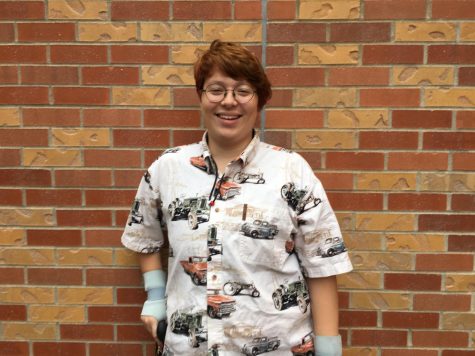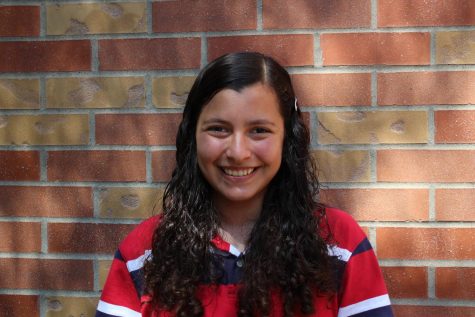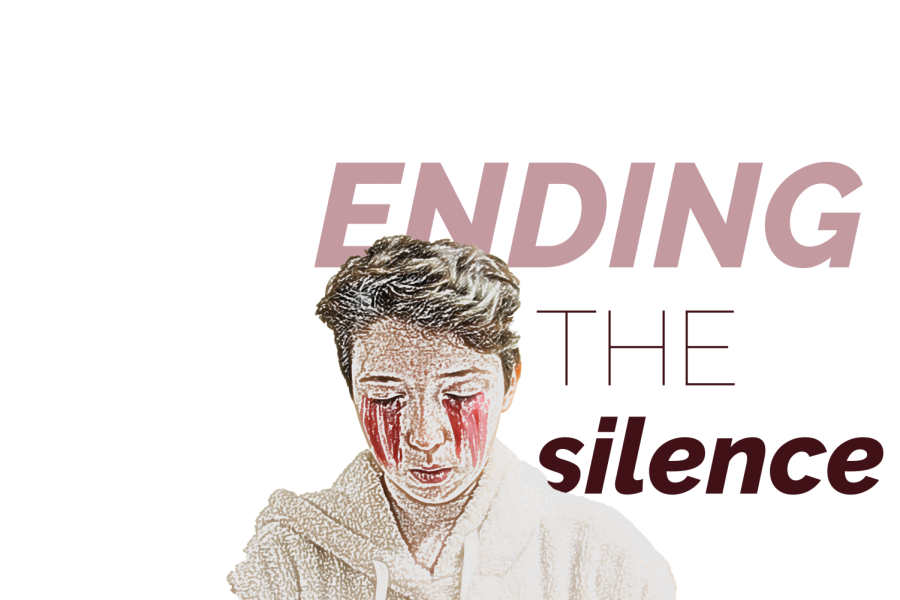Ending the Silence
Olathe North students speak out about their sexual assault and harassment stories.
For years, victims of sexual harassment, sexual assault, and rape have been largely expected to hide their stories. Now, women like Christine Blasey Ford, Gwyneth Paltrow, Simone Biles, and more are finally coming to the surface and sharing their tales of sexual abuse. The #MeToo movement has inspired thousands of people to stand up and tell their own stories. Well known individuals like Harvey Weinstein, an owner of the Weinstein Company, and Larry Nassar, the USA Women’s Gymnastics physician now carry a connotation of sexual abuse because of the bravery of these survivors.
Sexual assault is defined by the Rape, Abuse, and Incest National Network (RAINN) as any sexual contact or behavior that takes place without the victim’s explicit consent. This can include groping and other unwanted sexual touching, forcing a victim to perform sexual acts, and attempted and completed rape. According to RAINN, 1 in 5 women and 1 in 71 men will be raped sometime in their lives.
Recently, Supreme Court Justice nominee Brett Kavanaugh was accused of attempted rape by Dr. Christine Blasey Ford, a woman he attended high school with. She was followed by Deborah Ramirez and Julie Swetnick. They have accused him of multiple sexual assaults.
Despite these allegations, Kavanaugh was confirmed for the Supreme Court on October 6th by one of the slimmest margins in American history, according to the New York Times. The final vote was 50 to 48, and almost entirely along political party lines. According to Newsweek, the FBI investigation of Kavanaugh was conducted within 10 days. Many skeptics questioned the authenticity of the investigation due to how quickly it was completed and the failure to investigate Dr. Blasey Ford. Thousands have shown their support for Blasey Ford, Ramirez, and Swetnick, and the media has been in a frenzy over the case.
“[I think] Brett Kavanaugh and the investigation against him are cor- rupt and sloppy,” expresses Olathe North sophomore and assault survivor Sarah Kasmer.* “This has [shown] America that not only are we supposed to be okay with a president who endorses sexual harassment and assault, but [also be okay with] two Supreme Court Justices with allegations against them for similar crimes.”
“What happened in high school does matter. Because for the victim, they relive the moment of being raped or assaulted over and over. It’s like losing a piece of yourself,” adds Olathe North sophomore Isabel Orr.
The media coverage of the Kavanaugh investigation has provoked reactions from survivors across the country. Olathe North students have offered their opinions on the media reportage.
“I’m upset, first of all, that [Kavanaugh] actually got into power. It’s just really upsetting, and it just kind of shows how much people actually value a woman,” says Olathe North junior Ally Harring.*
While the #MeToo Movement is changing lives and business structures across the United States, Olathe North’s students are coming out of the shadows to tell their own stories. Seven students have shared their pain, and they want it to be known that it happens more often than one might think.
“I was sexually harassed and assaulted while getting SCUBA certified,” Kasmer admits.“This guy was a couple years older than me. Over the course of the night, he [touched me in ways I did not consent to], trapped me and locked me in his room, followed me and waited outside the bathroom when I was going to change my clothes for the night, and wouldn’t let me text my friends without him [watching]. He defended himself by saying he was just a ‘touchy guy,’” Kasmer explains, fighting back tears.
“I was up all night shaking and crying, thinking every sound was him coming into my tiny cabin. [The guy] left the next morning, but I stayed for another day to finish my certification. He stole my dive log, which contained my phone number, address, email, and my parents’ information. I still don’t know if he kept that information. I was only 14 when it happened, and I haven’t seen him since,” says Kasmer.
She chose to share her story to finally feel free of keeping it a secret. “[I was sexually assaulted] about 2 years ago,” explains Orr. “[My abuser and I] went to the pool. He always treated me poorly, always putting me down. While we were at the pool, he upset me by calling my depression fake and stupid. Angry and upset, I went to leave, when he reached out, grabbing my [chest] and saying ‘this makes you feel better, right?’ I freaked out. I yelled, ‘Stop! Let me go!’ He only held on tighter. I was sobbing. He kept grabbing me and began to touch me even more. Struggling, I began to claw at him, hoping he’d let me go,” Orr explains, her face shadowed by the memory. “Just because I had those parts didn’t mean he had the right to touch me. I was no longer his girlfriend, but his plaything.”
According to RAINN, 7 out of 10 sexual assaults are committed by someone the victim knows. This often includes romantic partners, but can include family and close friends as well.
“The person that assaulted me was a man who I called ‘uncle,’ but wasn’t actually related to me,” explains Olathe North senior Kendall Lancaster.*
“He, my ‘abuela’ (again, no actual relation), and her son were living with us. They were immigrants, and my family loved my abuela enough to let her move in with her family. I was 11 [years old] at the time.. I was washing bins with a hose in the driveway, and I was having fun with it, getting absolutely soaked… The sun had almost gone down… My ‘uncle’ was sitting in the garage. I walked into the garage, still sopping wet, to close the garage door and dry off myself and the bins with a towel,” Lancaster explains.
“At this point, I should mention that my ill-fitting hand me downs [were wet and] hanging off of me. My ‘uncle’ stopped me on the steps and approached me, and proceeded to stroke my [chest]. Over and over again. His smile was so gross. I smiled back a really confused, nervous smile. To this day I’m still angry that I didn’t react more violently,” Lancaster adds.
“That night I cried myself to sleep. And I did so for a long time. After that, he wouldn’t stop taking pictures of me. I think he took pictures of me while I slept, but I’m not sure. I still have nightmares about him.”
The emotional repercussions of a sexual assault can be extreme. Some of the most common effects in survivors are depression, flashbacks, post traumatic stress disorder (PTSD), self harm, substance abuse, dissociation, eating and sleep disorders, and even suicide.
“I think the incident will always affect me. I mean, sexual assault or harassment will always affect everyone for their life. I don’t think anyone can ever truly get over it,” says Olathe North junior Meredith Latcham.*
Rape is one of the most underreported crimes in America. An estimated 63% of sexual assaults are not reported to to police, according to RAINN. Unfortunately, there is a common occurrence with reporting sexual harassment and assault cases. The victim might come forward, but the perpetrator receives little or no punishment.
Lancaster expressed a fear of getting their abuser deported if they told police, Orr feared that her abuser would tell everyone she was a liar, Latcham feared that the authorities would do nothing, and Kasmer felt that nobody would take her seriously if she reported it. However, there is another reason that keeps many victims from reporting: self-blame.
“[I didn’t report my assault because] I didn’t want anyone to know that I was weak and stupid enough to let this happen to me. I blamed a lot of it on myself, thinking things like ‘If I hadn’t worn those shorts maybe he would’ve left me alone, if I hadn’t acted like such a slut maybe I could’ve avoided all this,” Kasmer confesses.
“At first I didn’t think it was a big deal, but as I told people and as they made their comments and opinions, I just felt bad. I kind of said, ‘Oh yeah, this is why I shouldn’t wear shorts.’ I thought it was my fault because, I don’t know. It didn’t feel really good,” says Harring.
Many survivors are wondering how we can overcome this problem as a society, and what we can do to ensure that someday, nobody will have stories like this. Each interviewee had similar thoughts.
“[I think that] for starters, we should stop slut shaming. We should stop victim blaming and stop thinking that sexual harassment and assault aren’t a big deal,” suggests Kasmer.
“Show the world what is really happening. Show support for all assault victims,” Orr states.
“Believe them. Take them seriously. Give them some justice. That’s all we could ask for,” Lancaster says.
“I think we should teach stu- dents about consent… because [the #MeToo Movement] is still going on, like we’re in the 21st Century, and we’re still seeing people victim blaming and people being afraid to speak out against assault, and I think that’s wrong. We’re so advanced, yet so far behind,” says Harring.

Number of years on the paper: This is Mile's second year on the paper
Grade Level: 12th grade, Senior
Favorite part of Newspaper: "I like seeing...

Number of years on the paper: This is Ashley's third year on the paper.
Grade Level: 12th, Senior
Favorite part of Newspaper: "I love designing...






